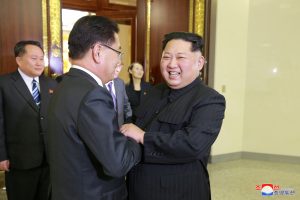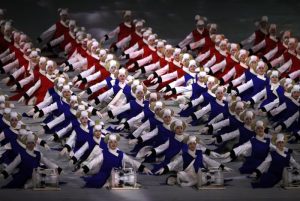
By Christine Kim
SEOUL (Reuters) – North Korea is willing to hold talks with the United States on denuclearisation and will suspend nuclear tests while those talks are under way, the South said on Tuesday after a delegation returned from the North where it met leader Kim Jong Un.
North and South Korea, still technically at war but enjoying a sharp easing in tension since the Winter Olympics in the South last month, will also hold their first summit in more than a decade next month at the border village of Panmunjom, the head of the delegation, Chung Eui-yong, told a media briefing.
“North Korea made clear its willingness to denuclearize the Korean peninsula and the fact there is no reason for it to have a nuclear program if military threats against the North are resolved and its regime is secure,” Chung said.
Reacting to the news, U.S. President Donald Trump tweeted: “We will see what happens!”
Chung cited the North as saying it would not carry out nuclear or missile tests while talks with the international community were under way. North Korea has not carried out any such tests since November last year.
“The North also said it can have frank talks with the United States on denuclearisation and the normalization of ties between North Korea and the United States,” Chung said.
The prospect of talks between the isolated North and the United States helped boost global stock markets, with the broadest gauge of global shares, MSCI’s All Country World Index, rising 0.6 percent and U.S. stock futures pointing to a higher opening on Wall Street.
TRADING THREATS
Washington and Pyongyang have been at loggerheads for months over the North’s nuclear and missile programs, with Trump and Kim Jong Un trading insults and threatening war. North Korea has regularly vowed never to give up its nuclear program, which it sees as an essential deterrent and “treasured sword” against U.S. plans for invasion.
The United States, which stations 28,500 troops in the South, a legacy of the Korean War, denies any such plans.
To ensure close communication, the two Koreas, whose 1950-53 conflict ended in a mere truce, not a peace treaty, will set up a hotline between South Korean President Moon Jae-in and Kim Jong Un, Chung said.
The last inter-Korean summit was in 2007 when late former president Roh Moo-hyun was in office.
The agreement came on the heels of a visit made by a 10-member South Korean delegation led by Chung to the North Korean capital, Pyongyang, on Monday in hopes of encouraging North Korea and the United States to talk to one another.
Kim Jong Un met senior South Korean government officials for the first time and said it was his “firm will to vigorously advance” inter-Korean ties and pursue reunification, the North’s official news agency said.
“Through this delegation visit, the South Korean government created a very important opportunity to manage North Korea’s nuclear and missile threats, prevent war on the Korean peninsula and create military trust going forward,” said Cheong Seong-chang, a senior research fellow at the Sejong Institute.
Tensions between the two Koreas eased during the Olympics in South Korea, where Moon hosted a high-level North Korean delegation and the two sides presented a joint women’s ice hockey team. Kim Jong Un had invited Moon to North Korea for a summit, which was the first such request from a North Korean leader to a South Korean president.
Some U.S. lawmakers reacted with cautious optimism to signs of an opening for dialogue.
“This is encouraging,” Democratic Senator Chris Coons said in an interview with MSNBC on Tuesday. “This suggests that diplomacy can be the follow on to confrontation.”
Republican Senator Jeff Flake told MSNBC: “This is encouraging news. It’s not definitive. I mean, I’m not sure that this will hold, but it is encouraging to see that they’re ready to talk.”

North Korean leader Kim Jong Un greets a member of the special delegation of South Korea’s President at a dinner in this photo released by North Korea’s Korean Central News Agency (KCNA) on March 6, 2018. KCNA/via Reuters
U.S.-S.KOREA DRILLS TO GO ON
North Korea has boasted of developing nuclear-tipped missiles capable of reaching the United States, in defiance of U.N. Security Council resolutions, but Pyongyang and Washington both say they want a diplomatic solution to the stand-off.
The first inter-Korean talks in more than two years were held early this year to bring North Korea to the Winter Olympics, when South Korea and the United States also postponed an annual joint large-scale military exercise that North Korea views as a preparation for invasion.
During this week’s visit, a senior Blue House official said North Korea was informed it was not feasible to postpone the joint military drills between South Korea and the United States again and that Kim Jong Un acknowledged the situation.
Kim Jong Un said he understood the drills, expected in April, would be of a similar scale seen in previous years, the official said. The North Korean leader also had a request for the world: that he be seriously acknowledged as a dialogue counterpart, said the official.
The South’s delegation leader, Chung, said he would travel to the United States to explain the outcome of the visit to North Korea and that he had a message from North Korea he would deliver to Trump.
Chung will later visit China and Russia, while Suh Hoon, the head of South Korea’s spy agency and another member of the delegation, will head to Japan.
The United States has said before it is open to talks but its position has been that dialogue must be aimed at North Korea’s denuclearisation, something Pyongyang has rejected.
Moon has also remained vigilant against North Korea’s weapons ambitions, saying on Tuesday South Korea should bolster its defenses in tandem with talks with Pyongyang.
The Pentagon has nevertheless said it was “cautiously optimistic” about the North-South talks, which resumed in January for the first time in two years.
(Reporting by Christine Kim; Additional reporting by Hyonhee Shin; Editing by Nick Macfie and Alex Richardson)









